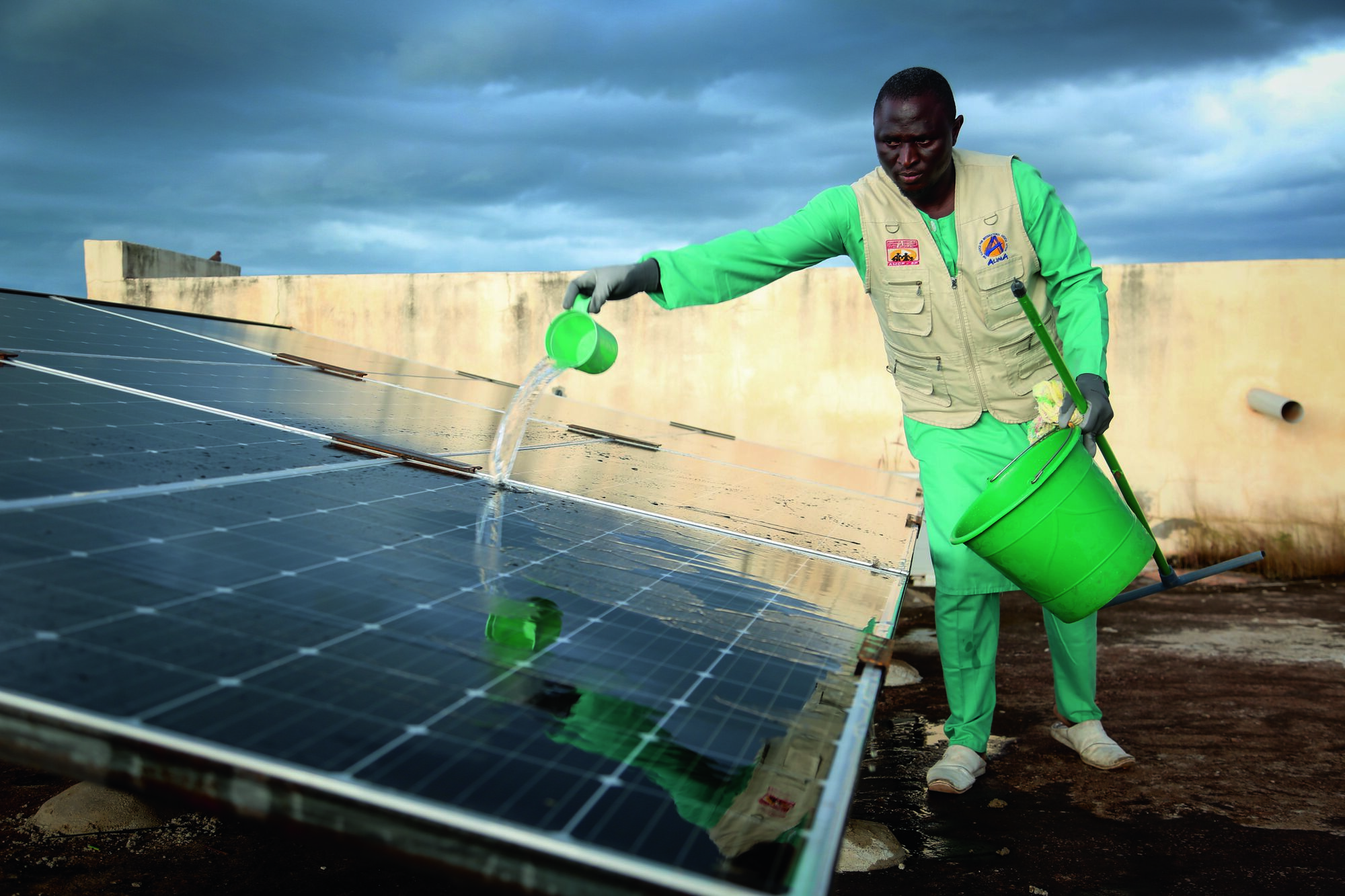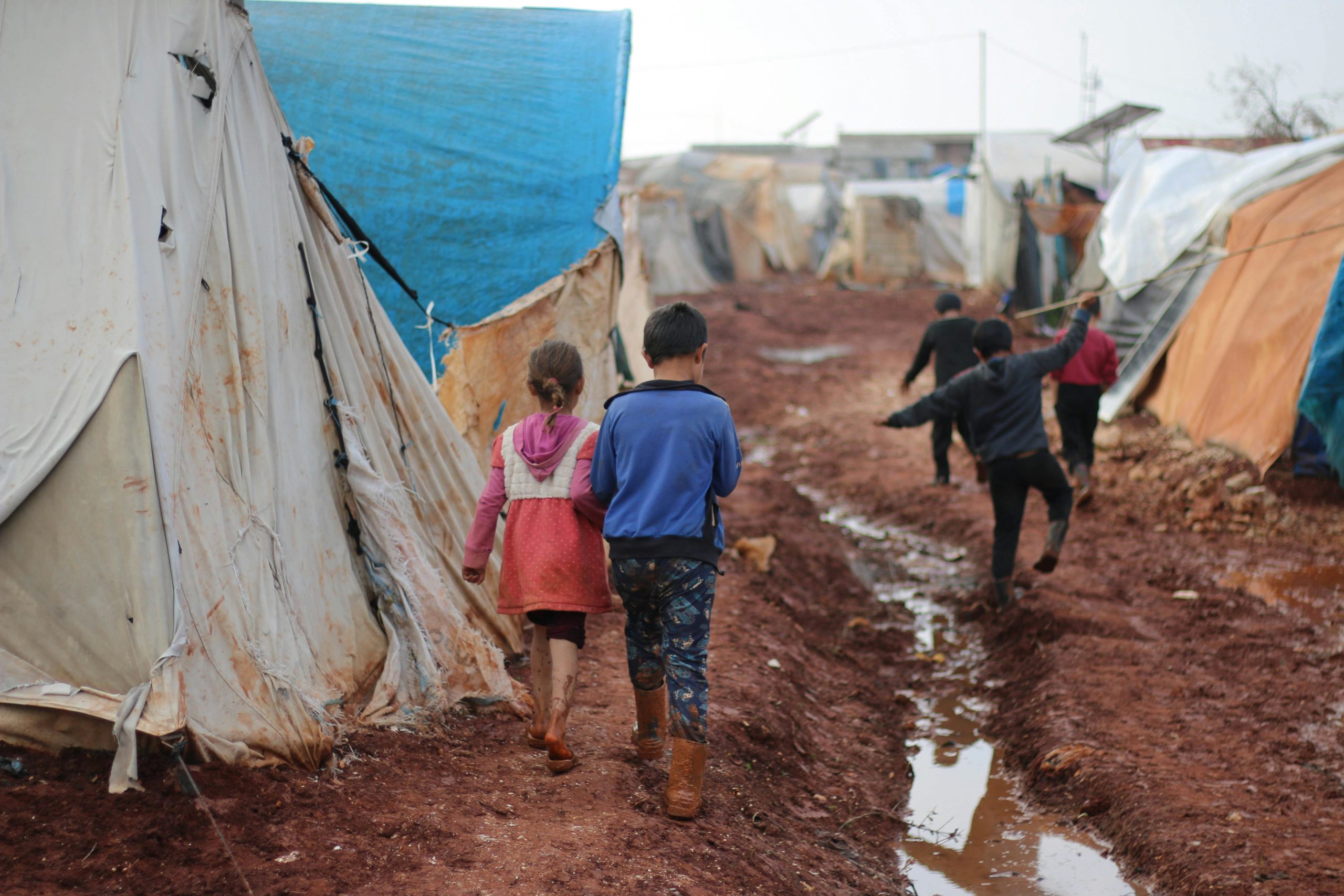- About our humanitarian sector decarbonisation roadmap
- Roadmap overview
- Sectoral analysis: a path to climate-smart humanitarian action
- Operational playbook for international humanitarian organisations
- Guiding principles for effective emissions reduction
- Enabling change: How UN and Donors can lead the way
- Download the Roadmap
- Launch event of the roadmap
About our humanitarian sector decarbonisation roadmap
The climate emergency is one of the greatest challenges of our time and recognised as an ‘existential threat’ (1) to human society. (2) More frequent and more extreme weather events, such as droughts, flooding, tropical storms, and heatwaves can lead to new conflicts, displacements, migration, damage to essential infrastructure, disruption of food and water supplies, and public health emergencies. (3)
Every day, in their work, humanitarian actors witness the mass suffering and intensifying inequalities caused by the combination of conflict, climate change and environmental degradation. Increasingly faced with the unprecedented challenges posed by climate-related disasters, humanitarian organisations have committed to doing their part.
However, the humanitarian community is still unclear about the steps it needs to take to halve greenhouse gas (GHG) emissions by 2030 on the way to Net Zero, in line with the goals of the Paris Agreement, and the IPCC’s recommendations. (4)
In other words: how do we get from where we are to where we need to be?
To intensify efforts, Climate Action Accelerator has developed this Roadmap for Halving GHG Emissions in the Humanitarian Sector by 2030 as a tool to guide humanitarian actors towards meeting their own climate commitments while addressing both populations needs and organisational risk in a world increasingly under pressure.
Roadmap overview
-
Sectoral analysis: a path to climate-smart humanitarian action
-
Operational playbook for international humanitarian organisations
-
Guiding principles for effective emissions reduction
-
Enabling change: How UN and Donors can lead the way
Sectoral analysis: a path to climate-smart humanitarian action
To intensify efforts towards effective emissions reduction in the humanitarian sector, and despite significant data gaps, Climate Action Accelerator has conducted a preliminary analysis of the sector’s greenhouse gas (GHG) emissions profile, decarbonisation levers, and key solutions.
This initial estimate, based on extrapolations from financial expenditures, provides a breakdown of emissions by category (energy, transport, procurement, etc.) and by cluster (e.g., food aid and agriculture, health, nutrition).
The findings reveal that 75% of the sector’s GHG emissions stem from procurement, with food items alone accounting for 46%. Energy, freight, and travel contribute significantly, with one-third of procurement-related emissions linked to cash and voucher assistance (CVA).
Achieving a 50% reduction in emissions by 2030 will demand extremely significant levels of effort. Key priorities include:
- Maximising emissions reductions from energy, travel, and freight, potentially exceeding the -50% target.
- Urgent action to reduce procurement-related emissions, particularly (but not only) from food items.
- Advancing research to establish a sector-wide methodology for measuring and reporting emissions from CVA and identifying reduction strategies.
Crucially, these efforts must not compromise the quantity, quality, or timeliness of assistance delivered, particularly in light of the growing gap between populations’ needs and the aid provided. Instead, humanitarian actors are urged to embark on deep institutional and organisational transformations to remain “fit for purpose” in addressing the climate emergency.
Photo 1

Operational playbook for international humanitarian organisations
Since 2020, Climate Action Accelerator has been working with partner organisations in the humanitarian sector to develop a consistent, systematic, quantified and evidence-based approach to effective emissions reduction.
The Playbook summarises learnings from these pilot experiences. It outlines “five key steps” for building a roadmap toward effective emissions reduction and introduces a series of “Top eight Solutions”—actions targeting major emission sources such as fuel consumption, air travel, and more. It also offers methodological guidance, highlights the co-benefits of climate solutions, and assesses their financial impacts.
Additionally, the Playbook features key components of a monitoring framework, implementation principles, good practices and curated “must-reads” from within and beyond the humanitarian sector. By exploring its practical tools and insights, organisations can identify opportunities where climate action aligns with humanitarian goals, improving both the quality and accessibility of assistance delivered to those in need.
Explore the Playbook online Download the Playbook Back to overview
Photo 2

Guiding principles for effective emissions reduction
Over the past decade, recognised conceptual frameworks and best practices for climate action have emerged, oriented towards setting science-based targets for emissions reduction, and using recommendations from the Intergovernmental Panel on Climate Change (IPCC) latest report and from the Greenhouse gas (GHG) Protocol.
Adopting a set of principles for effective emissions reduction allows humanitarian organisations to:
- Be part of the global effort to genuinely address the climate emergency and limit global warming below 2C, as close as possible to 1.5°C above pre-industrial levels
- Maximise the volume of emissions avoided in the sector through harmonising practices across actors
- Pave the way for consistent data reporting, monitoring and analysis
Principles dropdown
1. Take responsibility on what you control and can influence
- Take immediate leadership and action wherever it is in the power of humanitarian organisations and donors to do so.
- Try to influence others within their networks and suppliers to do the same.
2. Engage in radical collaboration with others
- Engage in radical collaboration to learn from others inside and beyond the humanitarian sector, in particular local, national and international actors, but also public institutions and private businesses engaged in a similar effort. This may include technical partnerships to access in-depth knowledge and experience on a given subject; operational partnerships to accelerate the deployment of solutions; or strategic alliances to create communities of action.
- Remain committed as highlighted in the Climate and Environment Charter for Humanitarian Organisations, to openly share the knowledge and insights that will contribute to the development of people-centred, climate-resilient and sustainable operations.
3. Reinforce or maintain social goals and humanitarian principles
Reducing GHG emissions by 50% should not compromise organisations’ ability to deliver people-centred humanitarian assistance according to their goals and mandate:
- Maintaining their ability to provide timely and principled humanitarian assistance.
- Securing the quantity and quality of their programmes.
- Confirming their adherence to humanitarian principles, especially the ‘Do No Harm’ principle.
- Reducing emissions brings co-benefits for more effective humanitarian assistance.
- Being aware of overlaps with the global humanitarian agenda (Localization, Grand Bargain, Triple Nexus).
It’s about changing how organisations do things by operating within planetary boundaries, not what they do.
4. Set quantified targets and milestones
Each organisation should commit to halving emissions as close as possible to 2030 on a path to achieving net zero in 2050, while adopting specific, quantified targets for each source of emissions:
- Calculate and monitor the carbon footprint.
- Define reduction targets in absolute terms. Base targets on identified solutions and actions for the main sources of emissions.
- Formulate effective reduction plans.
- Set quantified intermediary milestones on the way to 2030 and beyond.
By adopting quantified, science-based targets and best practice from the private sector, such as the Science Based Targets initiative (SBTi), they will contribute to bringing the humanitarian sector to operate within planetary limits, in line with the goals of the Paris Agreement and the recommendations of the IPCC.
5. Exercise integrity
- Comply with GHG Protocol standards.
- Include scopes 1, 2, and 3 in targets for GHG emissions reduction, which notably means that indirect emissions from the supply chain or use of distributed items are included.
- Take into consideration the full operational perimeter of their activities, including programmes delegated to or implemented by partners.
- Do not count carbon offsetting as a reduction in carbon accounting or claim to ‘carbon neutrality’ at the level of an organisation. If utilised, it should be viewed as a separate investment funding projects that may contribute to global carbon neutrality. Organisations who invest in carbon offsetting projects should ensure that these are socially and environmentally responsible, that they comply with the principle of ‘Do No Harm’ and that they meet the highest quality standards in terms of accountability.
6. Commit to transparency
- Monitor and report on emissions annually, including progress made against target – data quality should improve with time and inform more precise mitigation and adaptation actions.
- Share data publicly, especially with international and local partners, donors, and local communities.
7. Favour integrated approaches to climate and environment
Taking into account the various planetary boundaries:
- Promote integrated approaches that have a positive impact on biodiversity and the local environment, notably air, water and soil quality.
- Ensure that climate solutions and actions do no harm to the environment or limit harm at a minimal level.
- Favour solutions that simultaneously address adaptation, resilience and mitigation challenges and bear multiple co-benefits for affected populations and organisations.
8. Make the best use of resources, limiting consumption as and when relevant
Considering the primacy of delivering qualitative, effective humanitarian assistance, but also the extreme tension on sustainable resources, organisations should embrace a mindset of moderation and sufficiency in their organisational model and consumption of goods and services to avoid emissions, where possible, or other negative environmental impacts. In particular, they should:
- Prioritise the reduction of transport needs, then shift to alternative transport means
- Prioritise measures that favour the efficient use of resources, and avoid waste in order to limit procurement to goods and services to those that are necessary to fulfil the mission, then shift to alternative products & services.
- Prioritise the reduction of energy consumption, then shift to renewable energy.
9. Embark your community
- Demonstrate, and actively encourage peers, partner organisations and professional networks to adopt a principles-based approach to reducing their carbon and environmental footprint.
- Prioritise environmental awareness among staff – provide them with opportunities to contribute to the cultural shift and foster a culture of learning and adaptation, building expertise, tools and methods collectively.
- Encourage, initiate, join, or contribute to collective capacity-building efforts to accelerate knowledge-sharing and achieve economies of scale.
Note
To embark into a radical transformation journey, adopt and implement our “Guiding principles for effective emissions reduction”!
Photo 3

Enabling change: How UN and Donors can lead the way
Systemic actors, i.e. those who have the capacity to influence the humanitarian sector, such as humanitarian donors, United Nations (UN) entities, and large humanitarian organisations, are pivotal in transforming the sector into a “low carbon industry” at the necessary pace and scale.
In “Enabling change: How UN and Donors can lead the way”, Climate Action Accelerator explores how these actors have the capacity to lead by example by taking measures to reduce emissions in their own operations and for the programs they fund (programmatic portfolios), and by helping to shape ambitious policy, coordination, and funding frameworks.
Even though humanitarian donors are increasingly demonstrating their commitment to climate transformation, more robust efforts are needed. A three-tiered approach is essential:
- Implementing a mix of incentives and requirements, allowing a fair, progressive transition phase before requirements are fully implemented
- Enhancing funding opportunities for partners organisations through project-based funds and improving access to alternative sources of funding.
- Providing technical support to partners: capacity building, training and supporting technical-operational innovation.
UN humanitarian entities, which consistently channel around 50% of international humanitarian assistance, must lead transformative efforts. By adopting a principles-based approach in line with IPCC recommendations, and internationally recognised standards, the UN can maximize its emissions reduction potential. This involves setting and adhering to absolute emissions reduction trajectories.
Ultimately, the UN and donors are in a unique position to make the sector more ‘fit for purpose’. This means meeting the growing needs of the most vulnerable populations while adapting structures and modus operandi to the realities of the climate emergency.
Photo 4

Download the Roadmap
-
Executive summary & recommendations
Explore it here -
Guiding principles for GHG emissions reduction in humanitarian organisations
Explore it here -
A path to climate smart humanitarian action
Explore it here -
An operational playbook for organisations
Explore it here -
Enabling change: how the UN & donors can lead the way
Explore it here
Launch event of the roadmap
We are grateful to have released our sectoral roadmap for halving emissions by 2030 in the humanitarian sector at the German Federal Foreign Office (GFFO) in Berlin, on June 13th, 2024.
Climate Action Accelerator is extremely thankful to GFFO for co-organising this event, and for supporting this project.
Download the presentation Explore the programme
Sources
(1) In recent years, not only climate scientists but also world leaders including the UN Secretary General and the US Secretary of Defense, qualified climate change as “an existential threat to humanity”.
(2) W.J. Ripple et al., “World Scientists’ Warning of a Climate Emergency,” BioScience, Oxford University Press, 2020, pp. 8-12, https://www.jstor.org/stable/10.2307/26891410, (Accessed 28 May 2024).
(3) Working Group II to the Sixth Assessment Report of the Inter-Governmental Panel on Climate Change, “Climate Change 2022: Impacts, Adaptation, and Vulnerability,”2022, p. 9, https://www.ipcc.ch/report/ar6/wg2/downloads/report/IPCC_AR6_WGII_FullReport.pdf, (Accessed 28 May 2024).
(4) IPCC, ” AR6 2023 report”, 2023, https://www.ipcc.ch/report/sixth-assessment-report-cycle/, (Accessed 29 May 2024).
Featured
Operationalizing and Scaling-up Donors’ Climate and Environmental Commitments: an analysis of progress, gaps and opportunities
Leading the way: How donors and organisations can unlock financial blockages to accelerate the climate and environmental transformation of the humanitarian sector
Cover photo
Cover photo: Ahmed Akacha/Pexels
